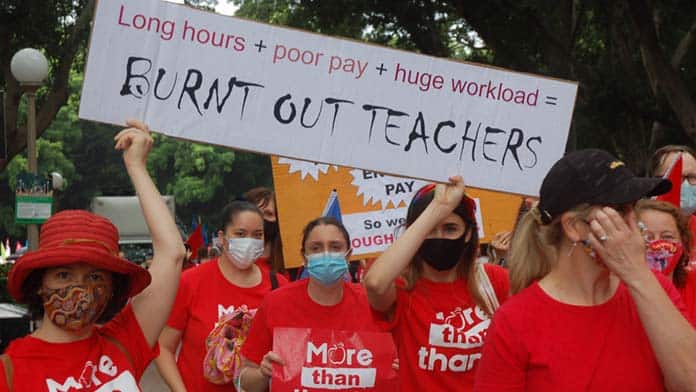Thousands of NSW Teachers Federation members took strike action today for a 5-7.5 per cent pay increase per year and two hours more planning and preparation time per week. The NSW Department of Education and Liberal Government is stubbornly refusing to budge.
Our demands are modest but they are desperately needed. Multiple reports and the NSW government’s own documents have found teacher workloads are unsustainable. No teacher needs these reports to tell us how bad it is.
The unsustainable conditions have led to the teacher shortage. Retaining and attracting teachers requires better pay and conditions. Lack of teachers is resulting in students being left with minimal supervision and teachers teaching outside their areas of expertise. Students and teachers deserve better.
Break the pay cap
In 2011, the NSW government introduced a public sector pay cap of 2.5 per cent per year. This policy has seen wage increases below inflation, and wages stagnating across the public sector.
The pay cap is particularly punitive considering the rising workloads and health risks teachers, nurses, paramedics, transport workers and other public sector employees have faced working through the pandemic.
True to form, the Industrial Relations Commission (IRC) has ruled the strike illegal and it will impose the government’s declared pay cap.
It is a great step forward that the union is defying the IRC’s order. It shows that bad laws can be broken, and such orders can successfully be defied.
This is a valuable lesson for teachers, nurses and railway workers. If we are going to break the Liberal government’s pay cap and win progressive change, we will almost certainly need to defy IRC orders in the future.
Further action needed
The pay cap and our demands for planning time are unlikely to be won with a single strike. Planning needs to begin for escalating action, including further strikes, in the first weeks of first term 2022.
Workers at a Country Road warehouse in Melbourne last month held a 12-day strike to win a 13.3 per cent pay rise over four years and 75 per cent permanency. FedEx truck drivers won 9.25 per cent over three years with rolling 24 hour stoppages. Similar extended action can win our demands.
Nurses, paramedics and transport workers have all taken industrial action this year. United industrial action would further amplify our fight for wage justice. It is all of us that keeps this state running, and it is by using our industrial strength that we will win improvements.
Escalate the action—fight till we win!
Previous award negotiations have seen the union settle for trade-offs in conditions, such as the pre-2016 teacher pay inequity. The enormity of our workload leaves no room for trade-offs or concessions. We must fight till we break the pay cap and win a reduction in our workload.
Rank-and file-teachers need to link up across schools and push the arguments to escalate the action within the union to ensure we get the best deal possible.
This is the text of a leaflet distributed at today’s rally by Solidarity rank-and-file teachers
Join a forum with other rank-and-file teachers:
After the NSW teachers strike: What’s the next step?
6.30pm Wednesday 15 December via Zoom, link to join at https://bit.ly/3ipnvgg
Share experiences so far and discuss how we can build the campaign






